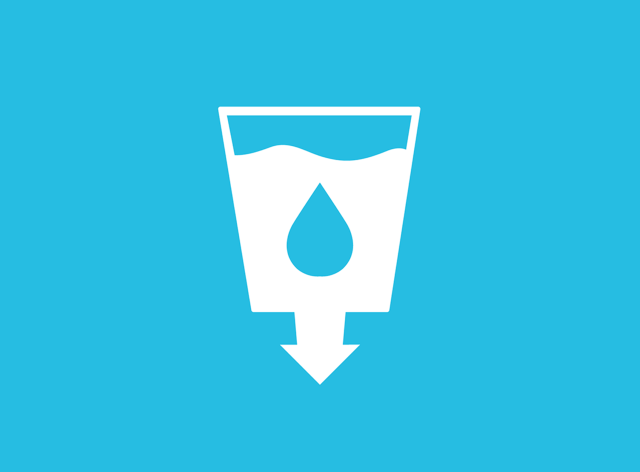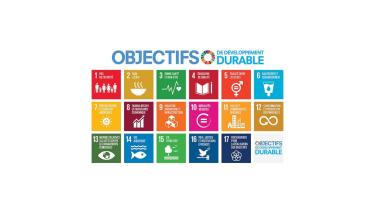On this page, you'll find a report on all the actions and activities initiated at the University of Namur in connection with United Nations Sustainable Development Goal #6: "Clean water and sanitation."
Social impact and actions
Institutional initiatives
Signature of a partnership with the University of Lorraine
The Unité de Recherche en Biologie Environnementale et Evolutive (URBE) and the UR AFPA are both experts in aquaculture. The aim of this project is to understand the effects of domestication on the reproduction and well-being of new species in aquaculture.
The idea of this research partnership is to involve more members of the research units in inter-institutional collaborations and to bring together complementary skills. The research project will also fund a minimum of 3 theses, one of which will be cotutored and the other two co-promoted.
Sustainable purchasing and consumption
Several initiatives have been put in place to reduce water consumption in the institution:
- maintenance: systematic detection of water leaks and analysis of distribution water circulating in pipes
- toilets:
- flushes with water-saving devices and automatic flushing of urinals (an action that now saves 3000 cubic meters of water per year)
- rainwater flushes in the new Faculty of Science
- laboratories: cooling system for scientific machines using closed-circuit recycled water rather than waste city water
- efficient sewage system
The University of Namur also provides free drinking water on campus via water fountains. Find out more about the newsroom via this link and this link.
Activities organized by Confluent des Savoirs
- CDS exhibition - Santé de nos rivières : en péril ?
A group of Franco-Walloon partners from universities, analysis laboratories and water stakeholders have launched the European DIADeM project to implement strategies for diagnosing water quality.
Driven by the desire to build bridges between science and society, the exhibition "Santé de nos rivières: en péril?" was developed. More info.
- Wednesday of Knowledge: river pollution
Wednesday afternoon workshops to discover science and technology for children aged 9 to 12. Learn more.
Collaborations and partnerships
SIENSANO - CoVWWSurv - National surveillance of SARS-CoV-2 and its variants in wastewater
UNamur, in collaboration with UAntwerp and UGhent, is working on the COVWWSURV. This involves setting up surveillance of the coronavirus (SARS-CoV-2) via wastewater analysis, with the aim of early detection of any significant evolution in virus circulation in the population. This surveillance system covers around 45% of the Belgian population, through twice-weekly analysis of wastewater entering treatment plants.
Operation River Cleanup
UNamur took part in the RIVER CLEAN-UP operation organized by the Capitainerie de Jambes.
Interreg ORION project
Using a multidisciplinary approach, the transboundary ORION project aims to diagnose and predict the quality of aquatic environments in the Meuse watershed. To achieve this, it is studying the various pressures on these natural environments, such as chemical and microbiological pollution (bacteria, viruses, antibiotic resistance), against a backdrop of global warming. The study and monitoring of these environments aims to anticipate the effects of pollution (assessment of vulnerabilities and resilience capacities) and to take measures for the sustainable management of aquatic ecosystems.
Research institutes
Institute of Life, Earth and Environment (ILEE)
Research at the Institute of Life, Earth and Environment (ILEE) fits in with several Sustainable Development Goals (SDGs) defined by the United Nations. For example, the impact of multiple stress factors and/or pollutants on both organisms and ecosystems is studied, and solutions are sought to strengthen their resistance and resilience and/or limit harmful products.
In addition, by prospecting and characterizing geological resources and integrating human use over the centuries, from antiquity to the current Anthropocene, ILEE contributes to better sustainable management of natural resources, integrating architecture and art in particular. The transition to more sustainable agriculture is investigated through the concept of ecosystem services, using mapping, modeling and integrated assessment. The consequences of climate change on migrations or interactions between the various agents responsible for the transmission of vector-borne and zoonotic diseases are also at the heart of ILEE's research.
Spin-off
e-biom
UNamur's spin-off created with the support of SPW Research's FIRST Spin-off program, e-biom combines an analytical laboratory and a scientific expertise office dedicated to biodiversity conservation, ecology and environmental protection. The aim is to support public and private players in integrating biodiversity considerations into all projects.
TRAQUA
UNamur spin-off created with support from the FIRST Spin-off program of SPW Research, TRAQUA is a consultancy specializing in water flow analysis and monitoring techniques. They offer technological solutions and customized expertise for all hydrogeological or hydrological issues (analysis, diagnosis, monitoring).
In the press
Chemical pollution of water | Frédéric Silvestre (UNamur - Institut ILEE) and Krishna Das (ULiège) explained the fundamental issues of ecotoxicology and the effects on fauna, flora and man in the "Les Eclaireurs" program on 01/10/2022 (RTBF/auvio). Read the article "Chemical pollution: no water is spared!" by RTBF.
La transition écologique en Province de Namur | Amaël Poulain (UNamur, TRAQUA spin-off) insists on the urgent water resource management challenges of the future in the "On saura tout" broadcast on 14/09/2022(LN24).
A new tool developed by UNamur to trace the path of groundwater | Amaël Poulain (UNamur, TRAQUA spin-off). The first tool developed by the University of Namur start-up Traqua can be used to determine the path taken by water underground. Previously, hydrogeologists had to disperse a fluorescent powder in the water and then track it to find out where it was going. Today, there's no need to visually follow this fluorescent trail. Probes take care of that. RTBF (24/06/2021)
Research
Discover all publications related to the sustainable development goal "Clean water and sanitation" on the UNamur research portal.

